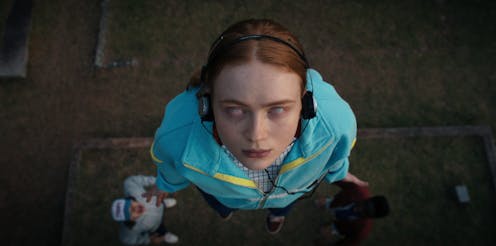Running Up That Hill: How Stranger Things and TikTok pushed Kate Bush’s 1985 pop classic back to the top of the charts
- Written by D. Bondy Valdovinos Kaye, Lecturer, Queensland University of Technology

Netflix’s nostalgia-laden thriller Stranger Things returned last month and with it came the revival of another classic from the 1980s, Running Up That Hill by Kate Bush. The song plays a prominent part in the narrative connected to one of the show’s leading teen cast members and is featured in a climatic, and visually stunning scene that has been making the rounds on the internet.
In a post shared to her website over the weekend, Kate Bush showered praise on the show and Netflix:
You might’ve heard that the first part of the fantastic, gripping new series of Stranger Things has recently been released on Netflix… It features the song, ‘Running Up That Hill’ which is being given a whole new lease of life by the young fans who love the show – I love it too!
Making a deal with TikTok
One thing missing from the acknowledgement is mention of another digital platform helping to boost the song’s presence: TikTok. A thirty-second version of the Stranger Things clip has been posted and reposted on TikTok, gaining millions of views in just over a week, and Kate Bush’s song has been used in over 500,000 short videos.
Videos featuring the song depict teens cosplaying as characters, acting out scenes from the shows, and making humorous meme videos (“my friends playing my favourite song trying to save me… my airpods die”).
Others engage less with Stranger Things and more with Kate Bush, in videos depicting connecting with parents over a shared love, recommending more of Bush’s music, and sharing joy that a new generation of audiences might be discovering the influential artist for the first time. The song speaks to misfits and of desperation, themes as relevant to teens in 2022 as they were in 1985.
Running up that hill and going viral
The runaway resurgence of Bush’s 1985 classic could be a signal to film and TV producers to make clips more “TikTokable”.
Songs with short catchy hooks that are attached to eye-grabbing visual sequences in clips that are sixty, or better yet thirty, seconds maximum are more likely to be picked up on and shared on TikTok.
The chances of going viral can be improved by choosing classic chart-toppers that may find a revival among younger audiences. Naturally when a beloved artist is found by Gen-Z audiences, it leads to gatekeeping by longtime fans as well as counter-gatekeeping by fans who are thrilled to see a younger audience connecting with one of their favourite artists’ music.
Stranger Things is not the first to capitalise on the power of musical nostalgia. The success of films like Guardians of the Galaxy have proven to be powerful tools to give older a reprisal on the radio and popular charts. TikTok challenges and audio memes have helped catapult other classics back into vogue such as Harry Belafonte’s Jump in the Line, The Shangri-Las’s Leader of the Pack remixed into Oh No by Kreepa, and, of course, Fleetwood Mac’s Dreams.
TikTok is a music-centric platform. It takes advantage of musical innovations pioneered on earlier short video platforms, like Flipagram, Dubsmash, and Musical.ly. These platforms allowed users to draw from an internal library of popular songs, creatively add them to video creations, and use features like Duet to place themselves side-by-side their favourite artists.
Unlike streaming services like Apple Music or Spotify, users can take a more active and playful role interacting with music on TikTok.
Radio and the charts
As with other musical TikTok phenomena, Running Up That Hill might be more than a momentary flash in the pan. In 2020, TikTok claimed over 70 artists who first emerged on the platform had secured record deals an the Billboard charts now frequently feature songs that went viral.
The song has returned to the Top 10 singles charts in the UK and is set to overtake Harry Styles As it Was as the number one single in Australia.
Kate Bush being reserviced to radio, physically or digitally delivering music to radio stations by her label, is a significant development. In the past much money and influence has been involved in getting music onto the radio. For a song that has not received play for decades to spontaneously reappear is a “watershed moment” according to a Warner Music label executive. Despite the growth and dominance of streaming, radio still plays a pivotal role for curation and discover in music markets such as the US, Australia, and around the world.
Radio play brings songs like to those who might not use TikTok or haven’t gotten around to watching the new season of Stranger Things.
While much focus in the music industry has centred on how to make songs go viral on TikTok, labels and artists might want to reconsider the radio as the true measure of success for songs traveling through the pipeline from TV to TikTok to Top 40.
Authors: D. Bondy Valdovinos Kaye, Lecturer, Queensland University of Technology





